Charles E W Bean, Diaries, AWM38 3DRL 606/8/1 - May - June 1915 - Part 2
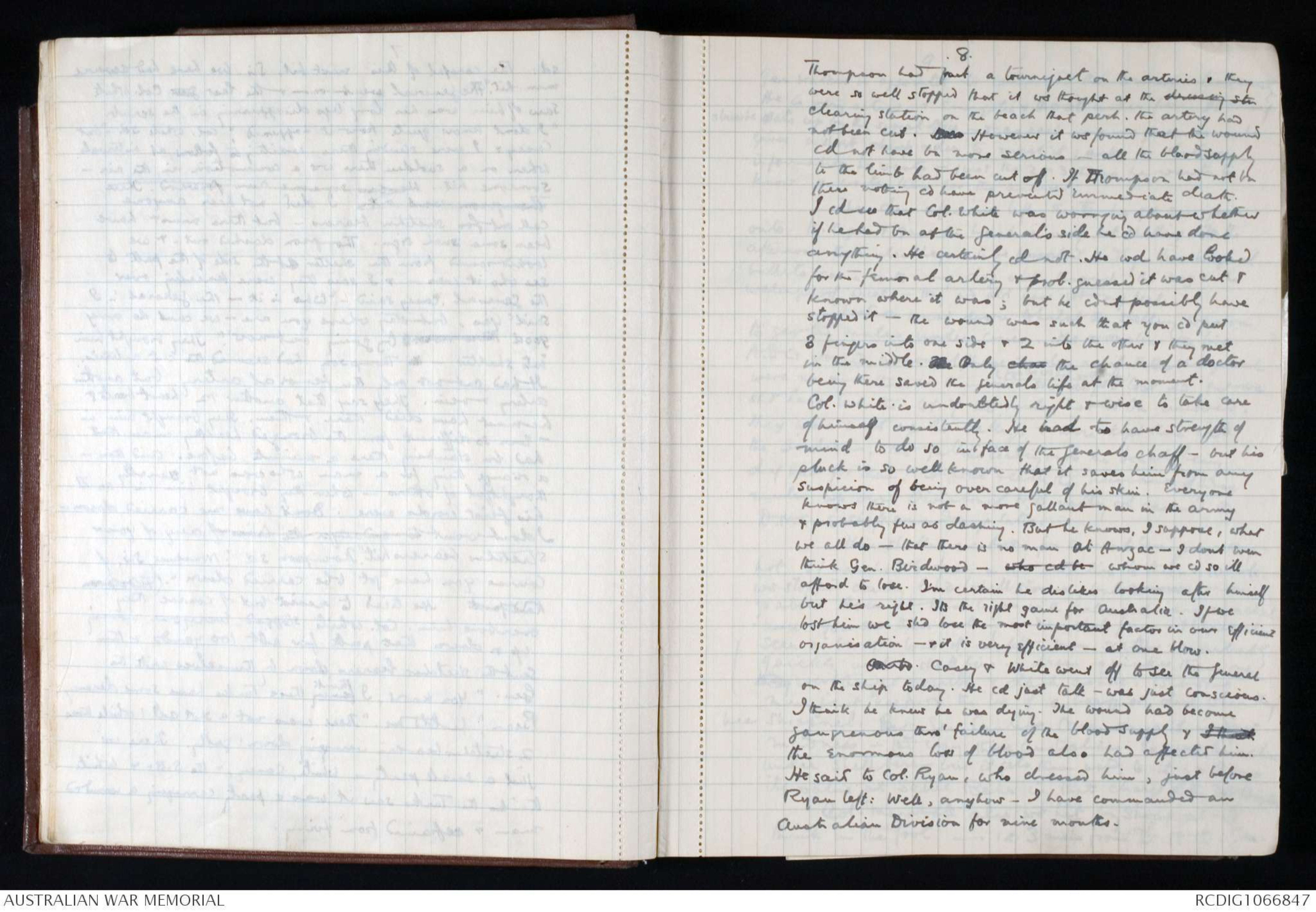
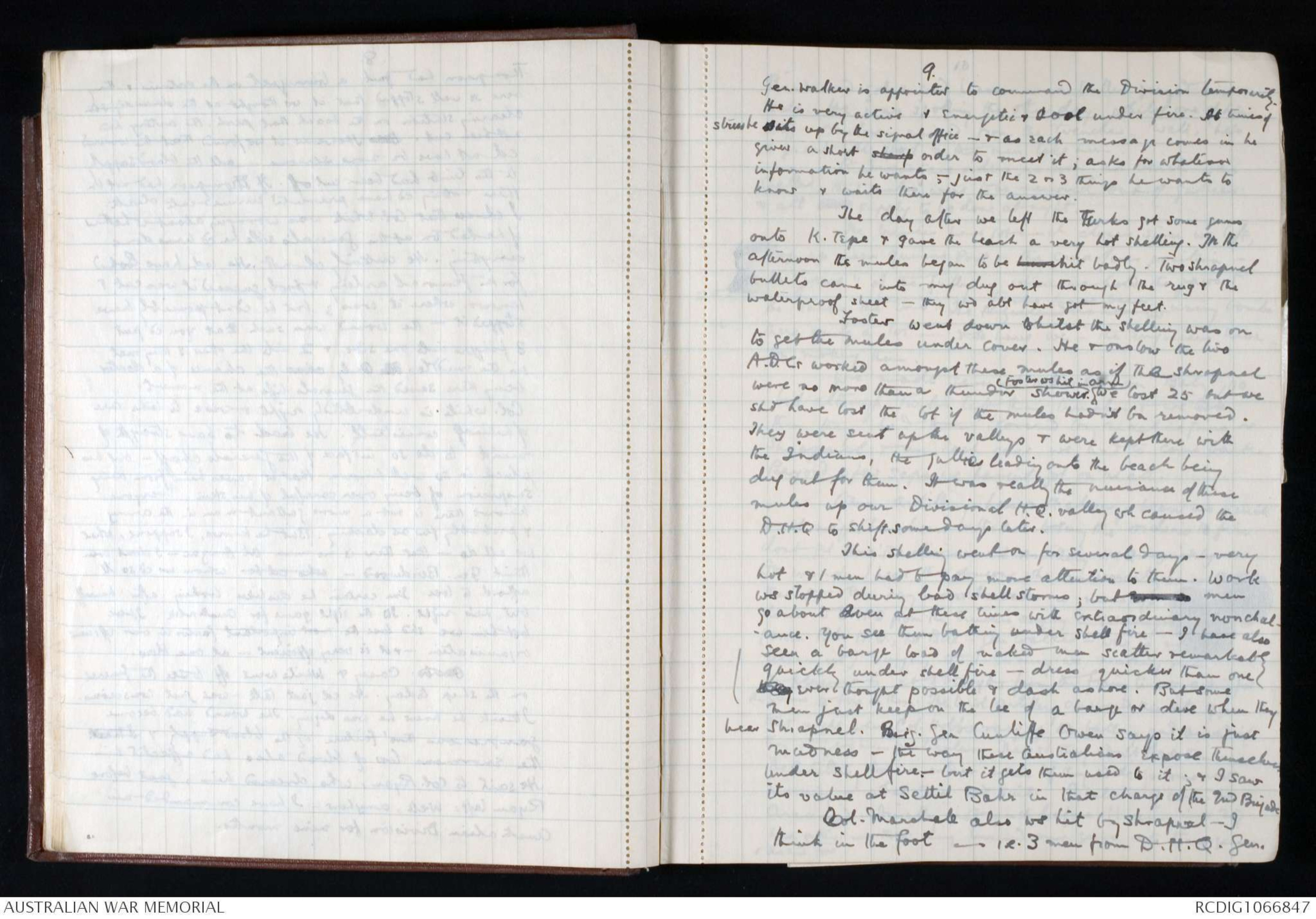
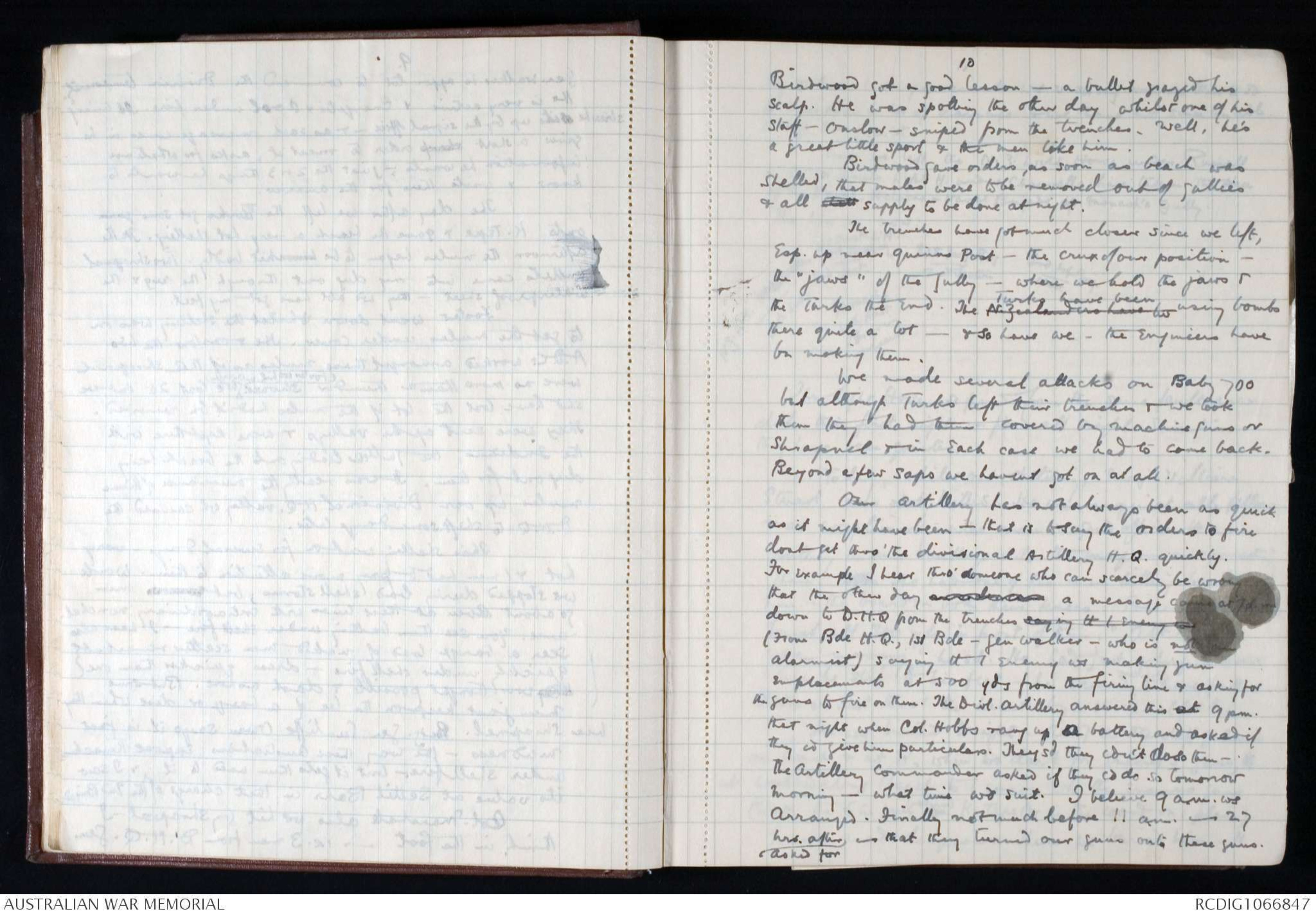
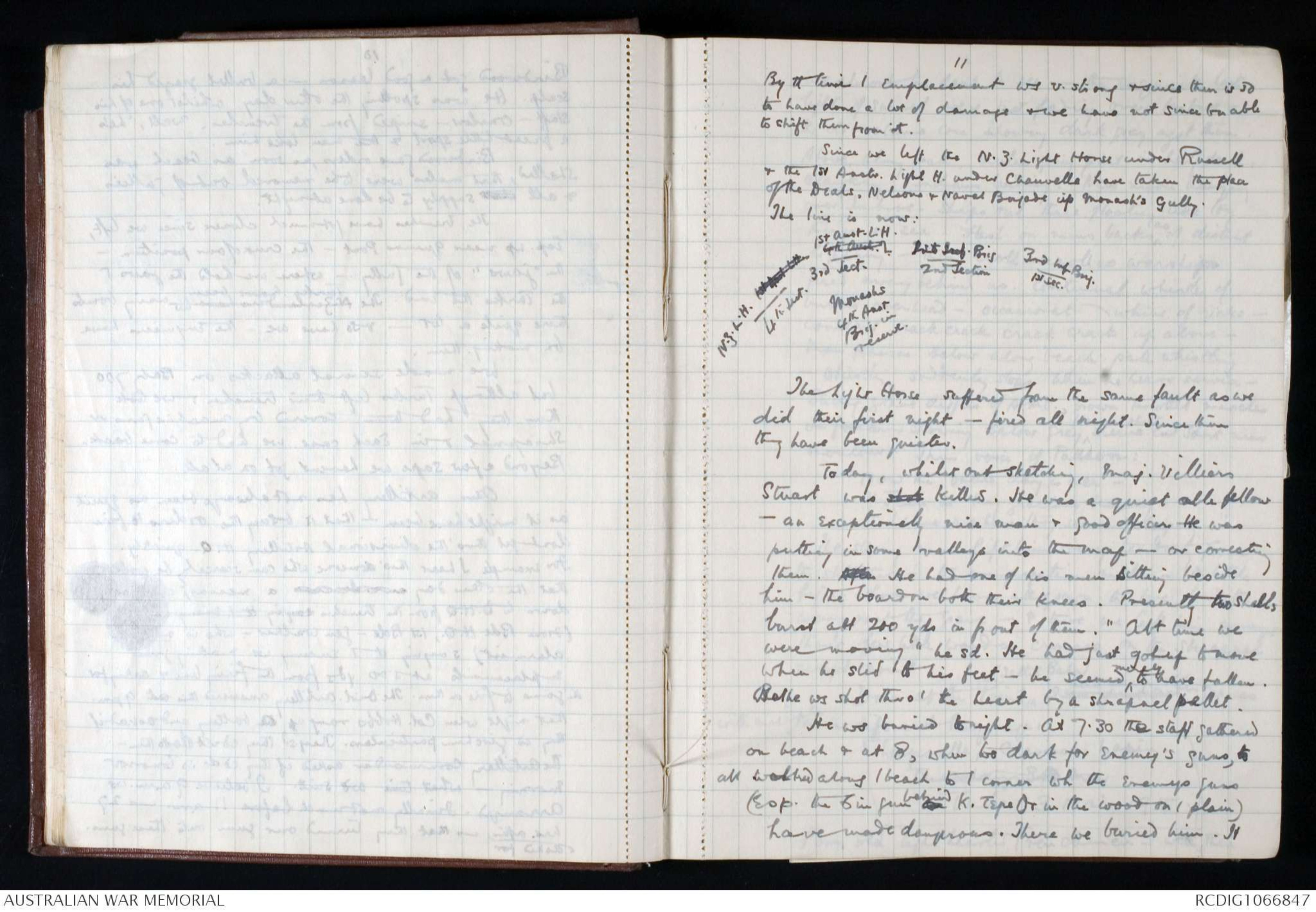
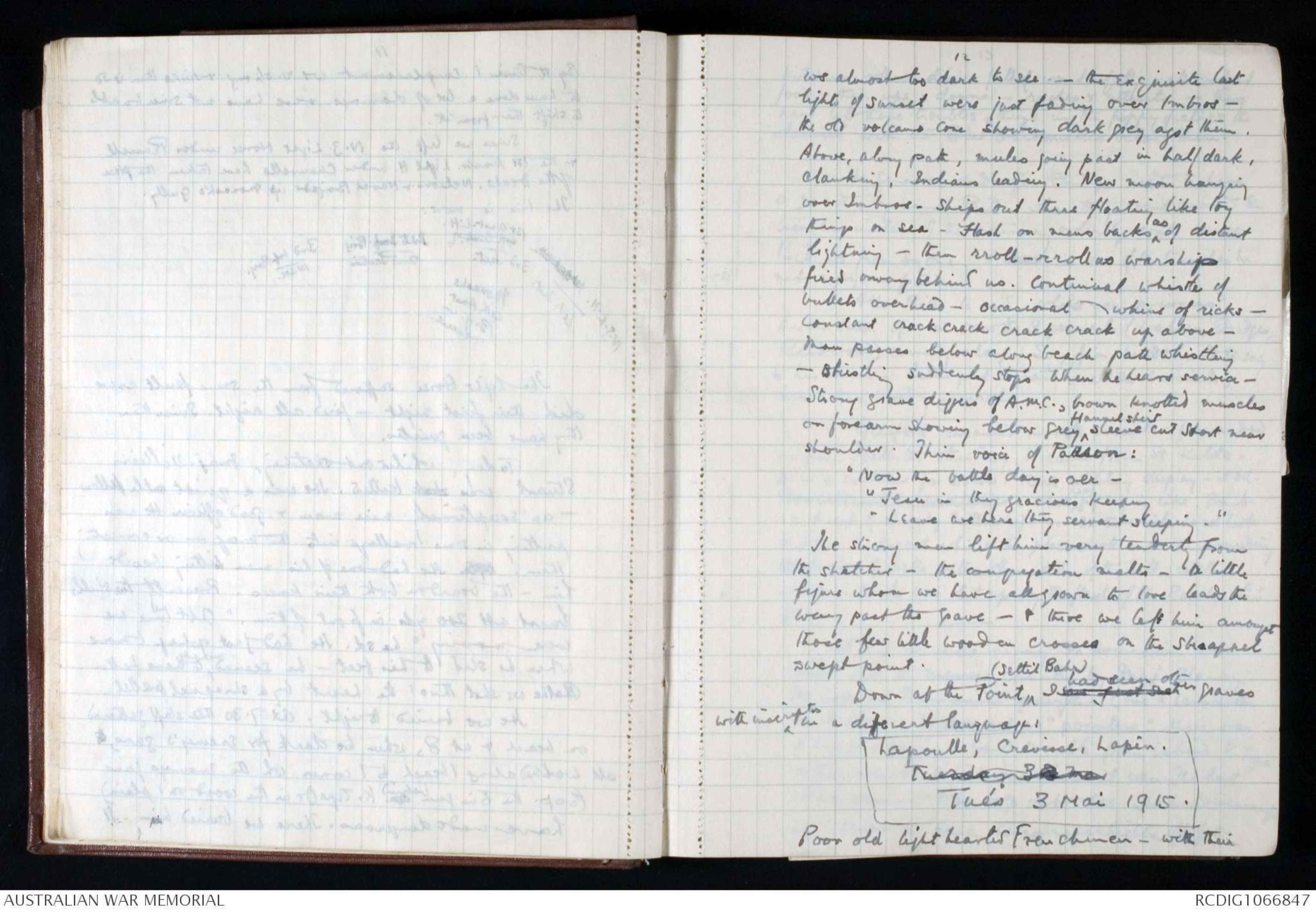
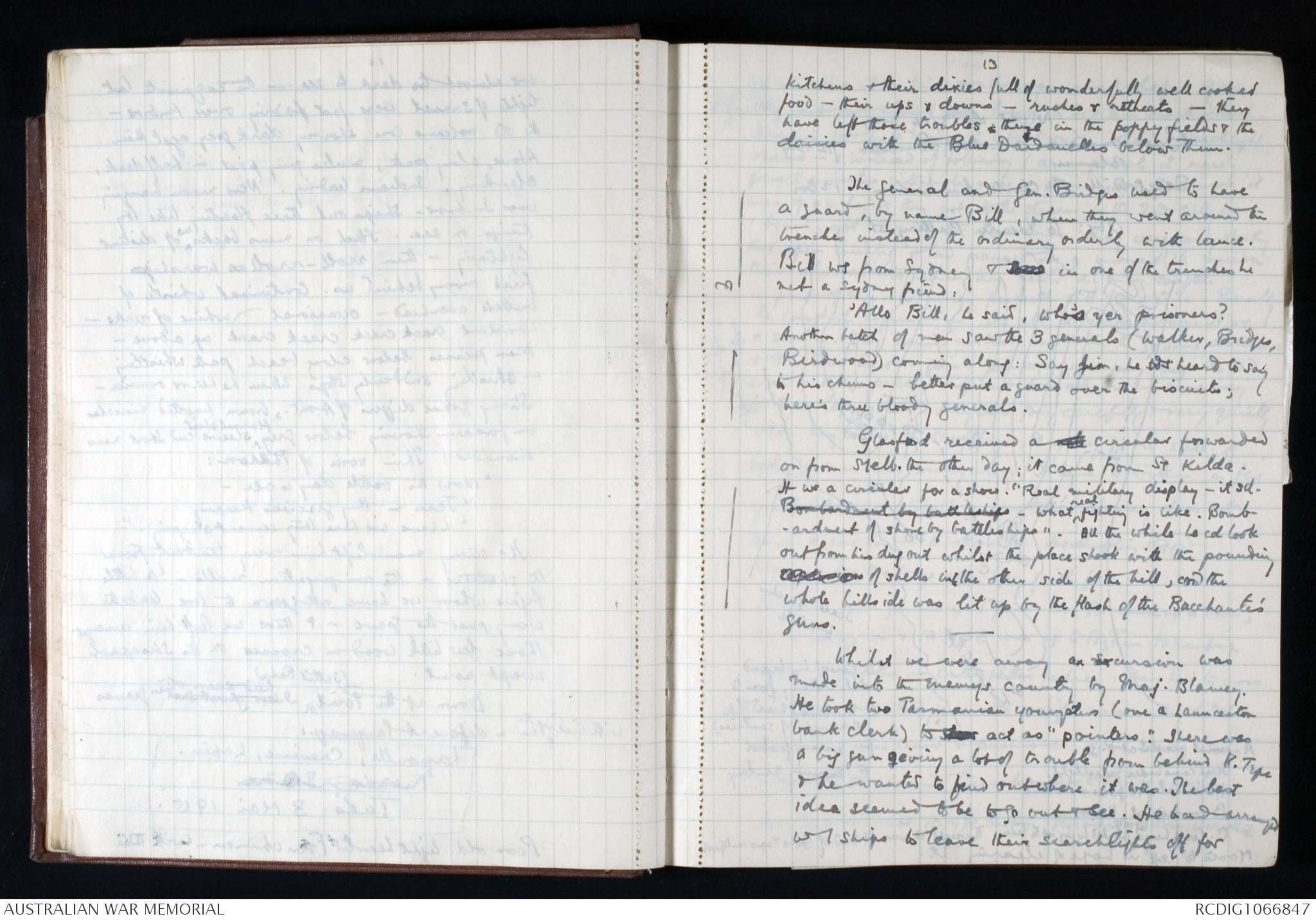
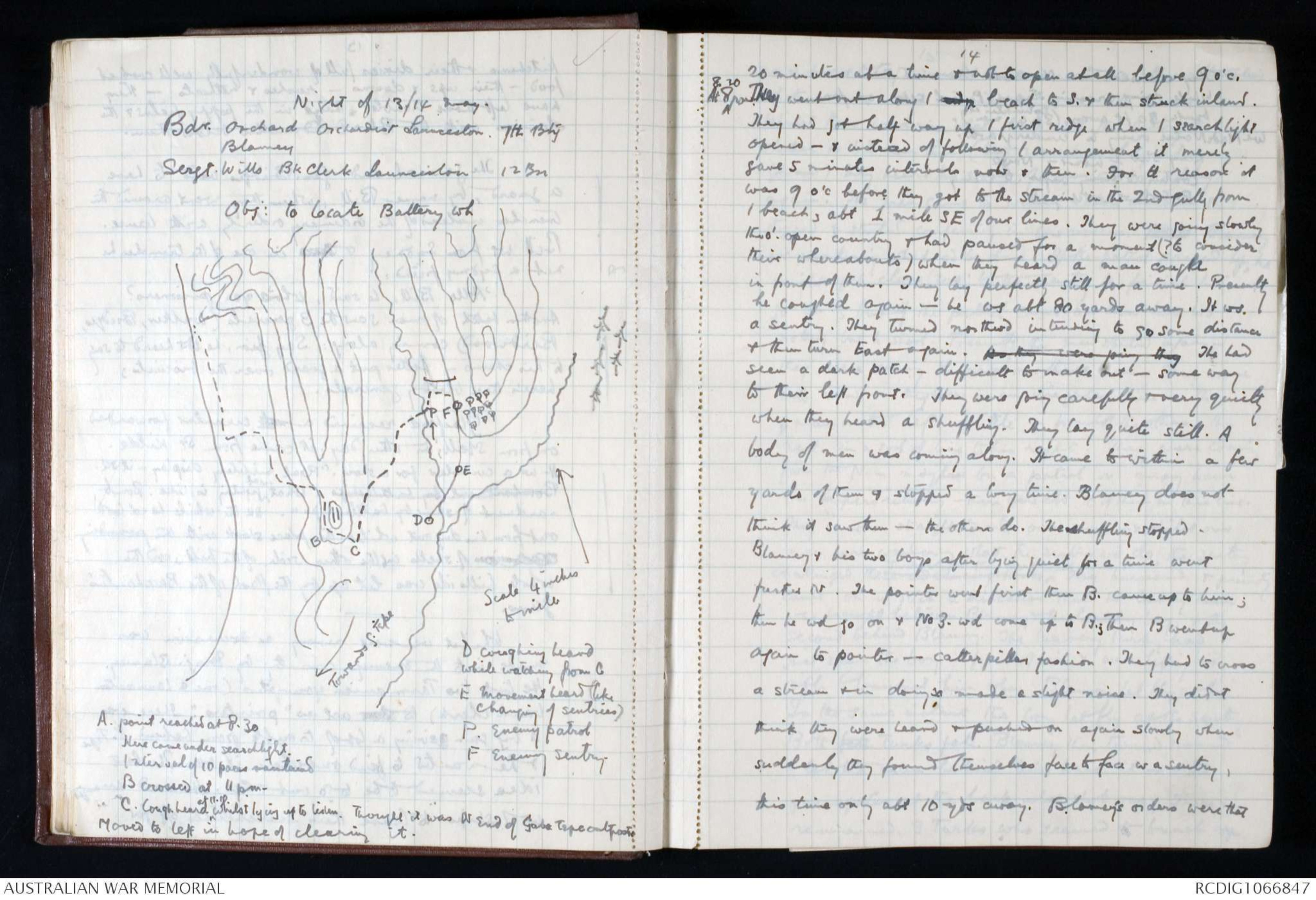
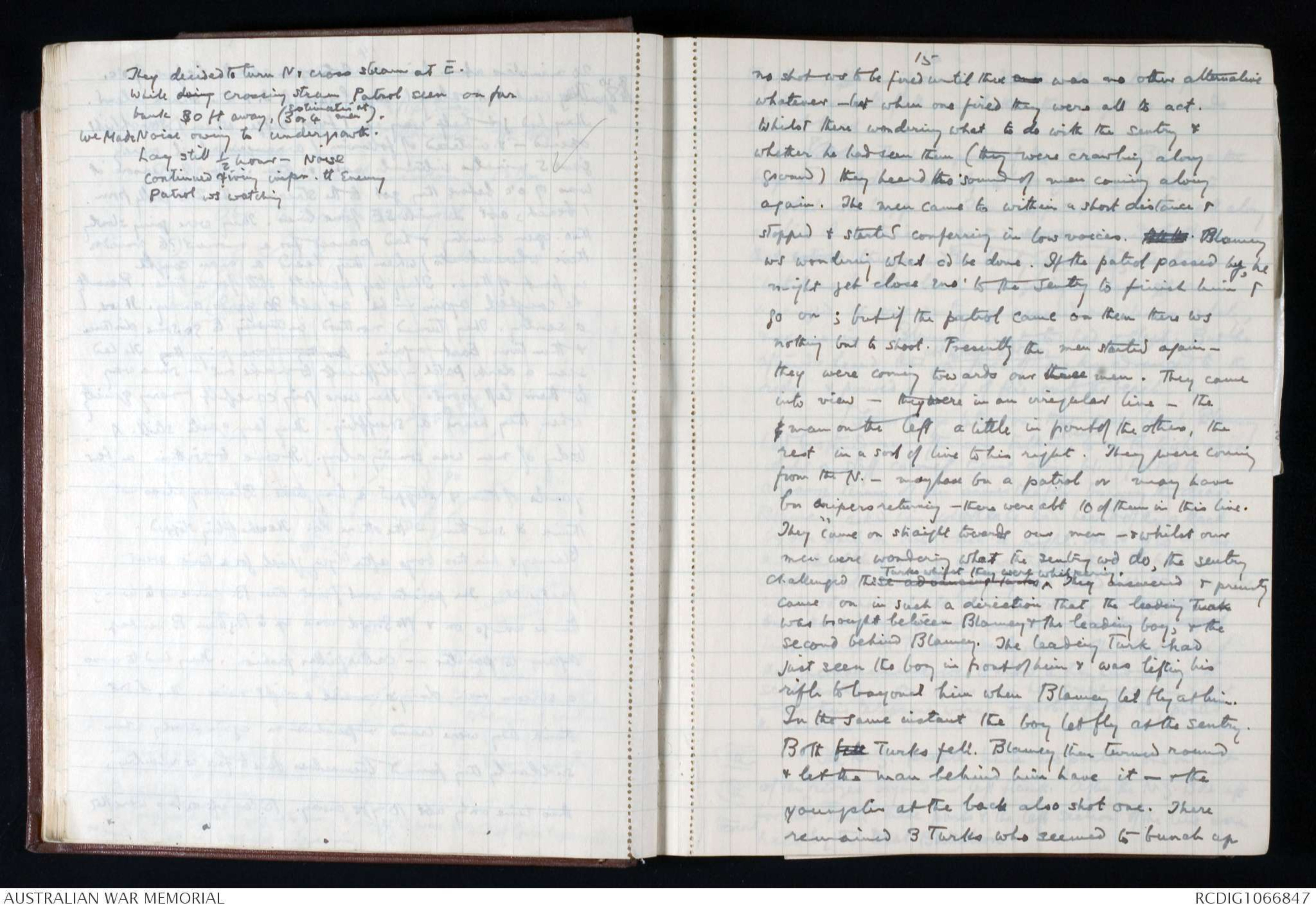
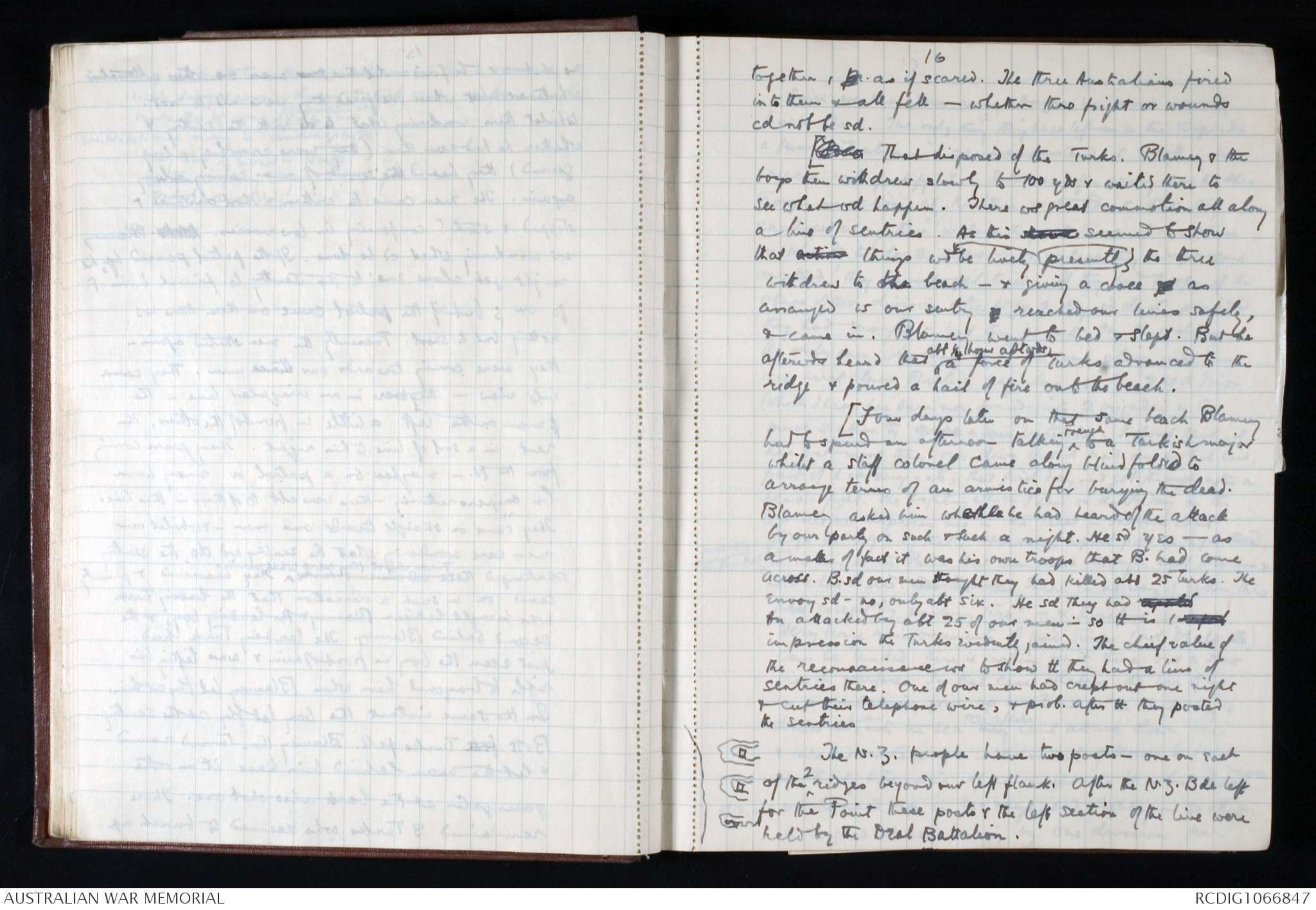
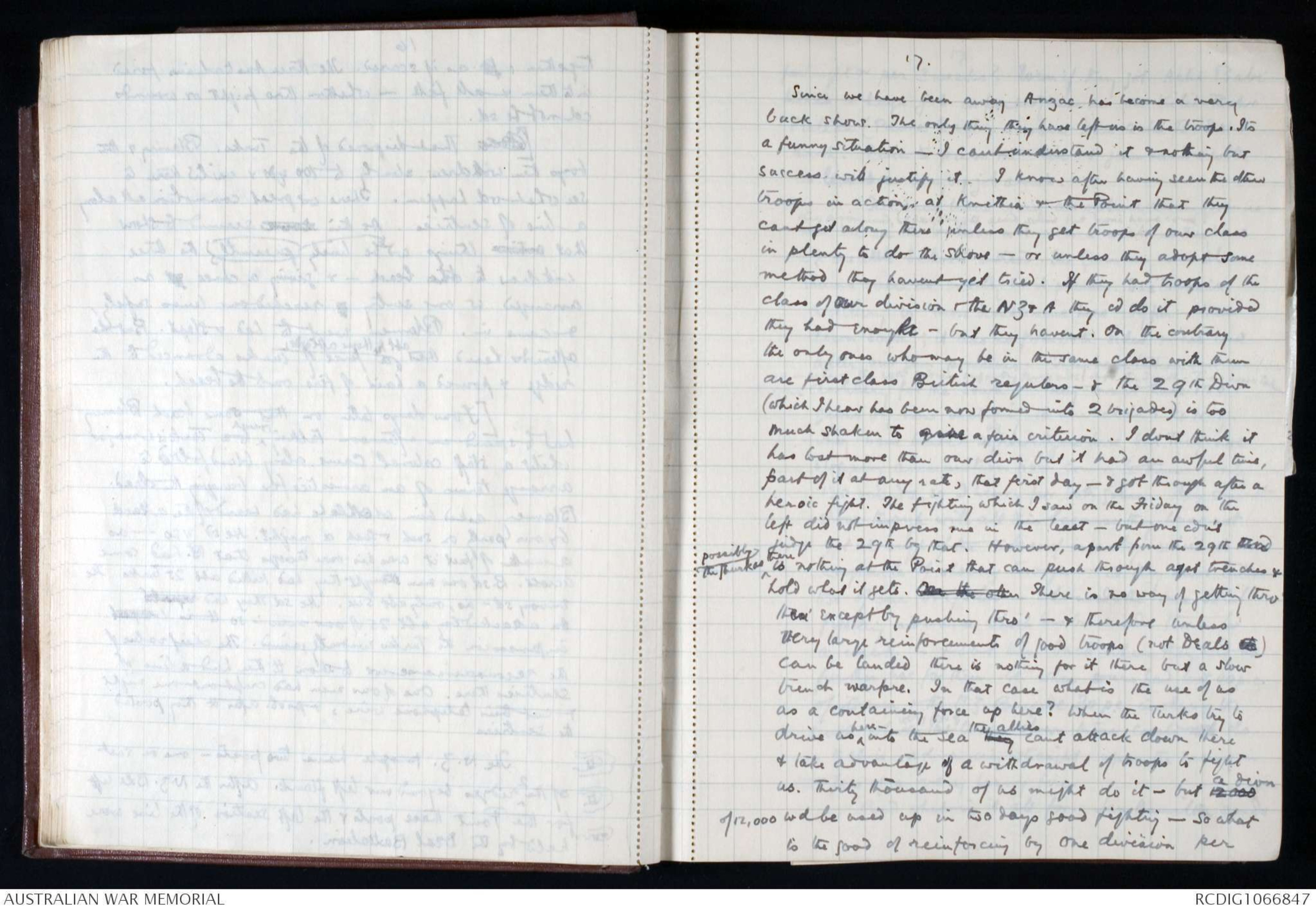
.8.
Thompson had put a tourniquet on the arteries & they
were so well stopped that it ws thought at the dressing stn
clearing station on the beach that perh., the artery had
not been cut. xxxx However it ws found that the wound
cd not have bn more serious - all the blood supply
to the limb had been cut off. If Thompson had not bn
there nothing cd have prevented immediate death.
I cd see that Col. White was worrying about whether
if he had bn at the General's side he cd have done
anything. He certainly cd not. He wd have looked
for the femoral artery & prob guessed it was cut &
known where it was; but he cdnt possibly have
stopped it - the wound was such that you cd put
3 fingers into one side & 2 into the other & they met
in the middle. The Only chan the chance of a doctor
being there saved the generals life at the moment.
Col. White is undoubtedly right & wise to take care
of himself consistently. He had to have strength of
mind to do so in face of the generals chaff - but his
pluck is so well known that it saves him from any
suspicion of being over careful of his skin. Everyone
knows there is not a more gallant man in the army
& probably few as dashing. But he knows, I suppose, what
we all do - that there is no man at Anzac - I dont even
think Gen. Birdwood - who cd be whom we cd so ill
afford to lose. I'm certain he dislikes looking after himself
but he's right. Its the right game for Australia. If we
lost him we shd lose the most important factor in our efficient
organisation - & it is very efficient – at one blow.
On bd Casey & White went off to see the General
on the ship today. He cd just talk - was just conscious.
I think he knew he was dying. The wound had become
gangrenous thro' failure of the blood supply & I think
the enormous loss of blood also had affected him.
He said to Col. Ryan, who dressed him, just before
Ryan left: Well, anyhow I have commanded an
Australian Division for nine months.
9
Gen. Walker is appointed to command the Division temporarily.
He is very active & energetic & cool under fire. At times of
stress he sits up by the signal office - & as each message comes in he
gives a short sharp order to meet it; asks for whatever
information he wants , - just the 2 or 3 things he wants to
know & waits there for the answer.
The day after we left the Turks got some guns
onto K. Tepe & gave the beach a very hot shelling. In the
afternoon the mules began to be xxxx hit badly. Two shrapnel
bullets came into my dug out through the rug & the
waterproof sheet - they wd abt have got my feet.
Foster went down whilst the shelling was on
to get the mules under cover. He & Onslow the two
A.D.Cs worked amongst these mules as if the shrapnel
were no more than a thunder shower. ^Foster ws hit in arm. We lost 25 but we
shd have lost the lot if the mules hadn't be removed.
They were sent up the valleys & were kept there with
the Indians, the gullies leading onto the beach being
dug out for them. It was really the nuisance of these
mules up our Divisional H.Q. valley wh caused the
D.H.Q to shift some days later.
This shelling went or for several days - very
hot & / men had to pay more attention to them. Work
ws stopped during bad shell storms, but xxxxxx men
go about even so this times with extraordinary nonchalance.
You see them bathing under shell fire - I have also
seen a barge load of naked men scatter remarkably
quickly under shell fire - dress quicker than onethey ever thought possible & dash ashore. But some
men just keep on the lee of a barge or dive when they
hear Shrapnel. Brig. Gen Cunliffe Owen says it is just
madness - the way these Australian expose themselves
under shellfire - but it gets them used to it; & I saw
its value at Settil Bahr in that charge of the 2nd Brigade
Col. Marshall also ws hit by shrapnel - I
think in the foot - IR 3 men from D.H.Q. Gen.
10
Birdwood got a good lesson - a bullet grazed his
scalp. He was spotting the other day whilst one of his
staff – Onslow - sniped from the trenches. Well, he's
a great little sport & the men like him.
Birdwood gave orders, as soon as beach was
shelled, that mules were to be removed out of gullies
& all that supply to be done at night.
The trenches have got much closer since we left,
esp. up near Quinns Post - the crux of our position -
the 'jaws' of the Jolly - where we hold the jaws &
the ^Turks the end. The N.Zealanders have hd Turks have been using bombs
there quite a lot - & so have we - the engineers have
bn making them.
We made several attacks on Baby 700
but although Turks left their trenches & we took
them they had them covered by machine guns or
Shrapnel & in Each case we had to come back.
Beyond a few saps we havent got on at all.
Our artillery has not always been as quick
as it might have been- that is to say the orders to fire
dont get thro' the divisional Artillery H.Q. quickly.
For example I hear thro' someone who can scarcely be wrong
that the other day xxxxxxxxxx a message came at 7am
down to D.H.Q from the trenches saying tt the ememy ws
(From Bde H.Q., 1st Bde - Gen Walker - who is not an
alarmist) saying tt / enemy ws making gun
enplacements at 500 yds from the firing line & asking for
the guns to fire on them. The Divl. Artillery answered this at 9 pm.
that night when Col. Hobbs rang up a battery and asked if
they cd give him particulars. They sd they cdn't do so then -
The Artillery Commander asked if they cd do so tomorrow
morning – what time wd suit. I believe 9am ws
arranged. Finally not much before 11 am. - 27
hrs. after ^asked for- that they turned our guns onto these guns.
11
By tt time / emplacement ws v.strong & since then is sd
to have done a lot of damage & we have not since bn able
to shift them from it.
Since we left the N.Z. Light Horse under Russell
& the 1st Austr. Light H. under Chauvelle have taken the place
of the Deals, Nelsons & Naval Brigade up Monash's Gully
The line is now:
[Hand drawn diagram - see original document]
The Light Horse suffered from the same fault as we
did their first night - fired all night. Since then
they have been quieter.
Today, whilst out sketching, Maj Villiers
Stuart was shot killed. He was a quiet able fellow
- an exceptionally nice man & good officer. He was
putting in some valleys into the map - or correcting
them. After He had one of his men sitting beside
him - the board on both their knees. Presently two shells
burst abt 200 yds in front of them. "Abt time we
were moving" he sd. He had just got up to move
when he slid to his feet - be seemed ^merely to have fallen.
But he ws shot thro' the heart by a shrapnel pellet.
He ws buried tonight. At 7.30 the staff gathered
on beach & at 8, when too dark for enemy's guns, xx
all walked along / beach to / corner wh the enemys guns
(esp. the 6 in gun on behind K. Tepe or in the wood on / plain)
have made dangerous. There we buried him. It
12
ws almost too dark to see - the exquisite last
lights of sunset were just fading over Imbros -
the old volcano cone showing dark grey agst them.
Above, along path, mules going past in half dark,
clanking, Indians leading. New moon hanging
over Imbros - ships out there floating like toy
things on sea - Flash on mens backs ^as of distant
lightning - then rroll - rroll as warship
fired away behind us. Continual whistle of
bullets overhead - occasional whine of ricks -
constant crack crack crack crack up above-
Man passes below along beach path whistling
- whistling suddenly stops when he hears service -
Strong grave diggers of A.M.C., brown knotted muscles
on forearm showing below grey ^flannel shirt sleeve cut short near
shoulder. Then voice of Parson:
"Now the battle day is oer-
"Jesu in thy gracious keeping
" Leave we here thy servant sleeping."
The strong men lift him very tenderly from
the stretcher - the congregation waits - a little
figure whom we have all grown to love leads the
way past the grave – & there we left him amongst
those few little wooden crosses on the shrapnel
swept point.
Down at the Point ^(Settil Bahr) I saw just such had seen other graves
^with inscriptns in a different language.
Lapoulle, Crevisse, Lapin.Tuesday 3rd Mar
Tues 3 Mai 1915
Poor old light hearted Frenchmen - with their
13
kitchens & their dixies full of wonderfully well cooked
food - their ups & downs - rushes & retreats - they
have left those troubles & there in the poppy fields & the
daisies with the Blue Dardanelles below them.
The general and Gen. Bridges used to have
a guard, by name Bill, when they went around the
trenches instead of the ordinary orderly with lance.
Bill ws from Sydney & xxx in one of the trenches he
met a Sydney friend.
'Allo Bill, he said, who's yer prisoners?
Another batch of men saw the 3 generals (Walker, Bridges,
Birdwood) coming along. Say Jim, he ws heard to say
to his chums - better put a guard over the biscuits,
here's three bloody generals.
Glasford received a note circular forwarded
on from Melb. the other day; it came from St Kilda.
It ws a circular for a show. "Real military display - it sd.Bombardment by battleships what ^real fighting is like.
Bombardment of shore by battleships". All the while he cd look
out from his dug out whilst the place shook with the poundingexplosions of shells into the other side of the hill, and the
whole hillside was lit up by the flash of the Bacchante's
guns.
Whilst we were away an excursion was
made into the enemys country by Maj. Blamey.
He took two Tasmanian youngsters (one a Launceston
bank clerk) to show act as "pointers." There was
a big gun giving a lot of trouble from behind K. Tepe
& he wanted to find out where it was. The best
idea seemed to be to go out & see. He had arranged
w / ships to leave their searchlights off for
Night of 13/14 May.
Bdr. Orchard Orchardist Lanceston 7th Bty
Blamey
Sergt. Wills Bk Clerk Launceston 12 Bn
Obj: to locate Battery wh
[Hand drawn diagram - see original document]
14
20 minutes at a time & not to open at all before 9 o'c.
At 8 ^8.20 p.m. They went out along / beach to S. & then struck inland.
They had got half way up / first ridge when / searchlight
opened - & instead of following / arrangement it merely
gave 5 minute intervals now & then. For tt reason it
was 9 o'c before they got to the stream in the 2nd gully from
/ beach, abt 1 mile SE of our lines. They were going slowly
thro' open country & had paused for a moment (? to consider
their whereabouts) when they heard a man cough
in front of them. They lay perfectly still for a time. Presently
he coughed again - he ws abt 80 yards away. It ws.
a sentry. They turned northwd intending to go some distance
& then turn East again. As they were going they He had
seen a dark patch - difficult to make out - some way
to their left front. They were going carefully & very quietly
when they heard a shuffling. They lay quite still. A
body of men was coming along. It came to within a few
yards of them & stopped a long time. Blamey does not
think it saw them- the others do. The shuffling stopped.
Blamey & his two boys after lying quiet for a time went
further N.. The pointer went first then B. came up to him;
then he wd go on & No. 3. wd come up to B; Then B went up
again to pointer - catterpillar fashion. They had to cross
a stream & in doing so, made a slight noise. They didnt
think they were heard & pushed on again slowly when
suddenly they found themselves face to face with a sentry,
this time only abt 10 yds away. Blamey's orders were that
They decided to turn N & cross stream at E.
While doing crossing stream Patrol seen on far
bank 30 ft away, (estimated at 3 or 4 men).
We made noise owing to undergrowth.
Lay still ½ hour - Noise
continued giving impr. tt enemy
patrol ws watching.
15
no shot ws to be fired until there was was no other alternative
whatever - but when one fired they were all to act.
Whilst there wondering what to do with the sentry &
whether he had seen them (they were crawling along
ground) they heard the sound of men coming along
again. The men came to within a short distance &
stopped & started conferring in low voices. xxxx Blamey
ws wondering what cd be done. If the patrol passed by, he
might yet close eno' to the sentry to finish him &
go on; but if the patrol came on them there ws
nothing but to shoot. Presently the men started again -
they were coming towards our three men. They came
into view – they were in an irregular line – thexx man on the left a little in front of the others, the
rest in a sort of line to his right. They were coming
from the N.- may have bn a patrol or may have
bn snipers returning - there were abt 10 of them in this line.
They came on straight towards our men & whilst our
men were wondering what the sentry wd do, the sentry
challenged these advanving Turks ^Turks whilst they were whispering. They answered & presently
came on in such a direction that the leading Turk
was brought between Blamey & the leading boy, & the
second behind Blamey. The leading Turk had
just seen the boy in front of him & was lifting his
rifle to bayonet him when Blamey let fly at him.
In the same instant the boy let fly at the sentry.
Both fell Turks fell. Blamey then turned round
& let the man behind him have it - & the
youngster at the back also shot one. There
remained 3 Turks who seemed to bunch up
16
together, pe as if scared. The three Australians fired
into them & all fell - whether thro fright or wounds
cd not be sd.
xxxx That disposed of the Turks. Blamey & the
boys then withdrew slowly to 100 yds & waited there to
see what wd happen. There ws great commotion all along
a line of sentries. As this show seemed to show
that action things wd ^ presently be lively the three
withdrew to the beach – & giving a cooee as
arranged w our sentry xx reached our lines safely,
& came in. Blamey went to bed & slept. But he
afterwds heard that ^abt 1/4 hour afterwds
a force of Turks advanced to the
ridge & poured a hail of fire onto the beach.
[Four days later on that same beach Blamey
had to spend an afternoon talking ^French to a Turkish major
whilst a staff colonel came along blindfolded to
arrange terms of an armistice for burying the dead.
Blamey asked him whether he had heard of the attack
by our party on such & such a night. He sd yes - as
a matter of fact it was his own troops that B. had come
across. B. sd our men thought they had killed abt 25 Turks. The
envoy sd - no, only abt six. He sd they had reported
bn attacked by abt 25 of our men - so tt is / report
impression the Turks evidently gained. The chief value of
the reconnaissance ws to show tt they had a line of
sentries there. One of our men had crept out one night
& cut their telephone wire; & prob. after tt they posted
the sentries.
[Hand drawn diagram - see original document]
The N.Z. people have two posts - one on each
of the ^2 ridges beyond our left flank. After the N.Z. Bde left
for the Point these posts & the left section of the line were
held by the Deal Battalion.
17
Since we have been away Anzac has become a very
back show. The only thing they have left us is the troops. Its
a funny situation - I cant understand it & nothing but
success will justify it. I know after having seen the other
troops in actions at Krithia & the Point that they
cant get along there unless they get troops of our class
in plenty to do the shove – or unless they adopt some
method they havent yet tried. If they had troops of the
class of our division & the NZ&A they cd do it provided
they had enough - but they havent. On the contrary
the only ones who may be in the same class with them
are first class British regulars - & the 29th Divn
(which I hear has been now formed into 2 brigades) is too
much shaken to give a fair criterion. I don't think it
has lost more than our divn but it had an awful time,
part of it at any rate, that first day - & got through after a
heroic fight. The fighting which I saw on the Friday on the
left did not impress me in the least - but one cdn't
judge the 29th by that. However, apart from the 29th and
^possibly the Ghurkas there is nothing at the Point that can push through agst trenches &
hold what it gets . On the other There is no way of getting thro'
there except by pushing thro - & therefore unless
very large reinforcements of good troops (not Deals etc)
can be landed there is nothing for it there but a slow
trench warfare. In that case what is the use of us
as a containing force up here? When the Turks try to
drive us ^here - into the sea they ^the allies can't attack down there
& take advantage of a withdrawal of troops to fight
us. Thirty thousand of us might do it - but 12000 a Divn
of 12,000 wd be used up in two days good fighting. So what
is the good of reinforcing by one division per
 Deb Parkinson
Deb ParkinsonThis transcription item is now locked to you for editing. To release the lock either Save your changes or Cancel.
This lock will be automatically released after 60 minutes of inactivity.